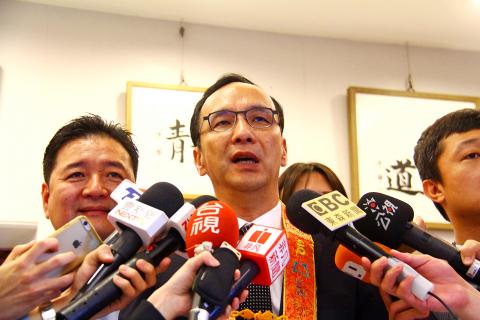Former New Taipei City mayor Eric Chu (朱立倫) yesterday said that the so-called “1992 consensus” should never be interpreted to mean “two Chinas,” adding that he believes Chinese Nationalist Party (KMT) Chairman Wu Den-yih (吳敦義) would remind Hon Hai Precision Industry Co chairman Terry Gou (郭台銘) of its meaning.
Gou, who on April 17 announced his intention to run in the KMT presidential primary, on Thursday said that although many have criticized him for saying that Taiwan is a part of China, what he meant by “China” was the “two Chinas” implied in “each side having its own interpretation” — namely “the Republic of China and the People’s Republic of China.”
The KMT’s platform has a clear definition and explanation of the “1992 consensus,” said Chu, who is also seeking the KMT’s presidential nomination.

Photo: Chiu Shu-yu, Taipei Times
“Its definition has been clearly set down since 1992 and definitely cannot be expressed as meaning ‘two Chinas,’” he said.
The definition has been observed by all party members and serves as an important basis for ensuring peaceful cross-strait exchanges, he said.
“That basis has not changed and will not change,” he added.
Asked if he was concerned that Gou’s remarks would provoke China, Chu said he believes Wu would clearly explain the issue to Gou when they meet at the KMT headquarters to discuss the party’s presidential nomination today.
The meeting had been scheduled for Saturday, but was postponed to today due to schedule conflicts.
In response to criticism over his “two Chinas” remarks, Gou yesterday said it is his core platform that Beijing must take the existence of the Republic of China seriously, although the manner in which it is expressed is not important.
He is not well-versed in political language, but he believes politics exist to serve the economy, not elections, Gou said.
The “1992 consensus” is a term former Mainland Affairs Council chairman Su Chi (蘇起) in 2006 admitted making up in 2000. It refers to a tacit understanding between the KMT and the Chinese government that both sides of the Strait acknowledge there is “one China,” with each side having its own interpretation of what “China” means.

Taipei has once again made it to the top 100 in Oxford Economics’ Global Cities Index 2025 report, moving up five places from last year to 60. The annual index, which was published last month, evaluated 1,000 of the most populated metropolises based on five indices — economics, human capital, quality of life, environment and governance. New York maintained its top spot this year, placing first in the economics index thanks to the strength of its vibrant financial industry and economic stability. Taipei ranked 263rd in economics, 44th in human capital, 15th in quality of life, 284th for environment and 75th in governance,

A former officer in China’s People’s Liberation Army (PLA) who witnessed the aftermath of the 1989 Tiananmen Square massacre has warned that Taiwan could face a similar fate if China attempts to unify the country by force. Li Xiaoming (李曉明), who was deployed to Beijing as a junior officer during the crackdown, said Taiwanese people should study the massacre carefully, because it offers a glimpse of what Beijing is willing to do to suppress dissent. “What happened in Tiananmen Square could happen in Taiwan too,” Li told CNA in a May 22 interview, ahead of the massacre’s 36th anniversary. “If Taiwanese students or

Greenpeace yesterday said that it is to appeal a decision last month by the Taipei High Administrative Court to dismiss its 2021 lawsuit against the Ministry of Economic Affairs over “loose” regulations governing major corporate electricity consumers. The climate-related lawsuit — the first of its kind in Taiwan — sought to require the government to enforce higher green energy thresholds on major corporations to reduce emissions in light of climate change and an uptick in extreme weather. The suit, filed by Greenpeace East Asia, the Environmental Jurists Association and four individual plaintiffs, was dismissed on May 8 following four years of litigation. The

The New Taipei City Government would assist relatives of those killed or injured in last month’s car-ramming incident in Sansia District (三峽) to secure compensation, Mayor Hou You-yi (侯友宜) said yesterday, two days after the driver died in a hospital. “The city government will do its best to help the relatives of the car crash incident seek compensation,” Hou said. The mayor also said that the city’s Legal Affairs, Education and Social Welfare departments have established a joint mechanism to “provide coordinated assistance” to victims and their families. Three people were killed and 12 injured when a car plowed into schoolchildren and their